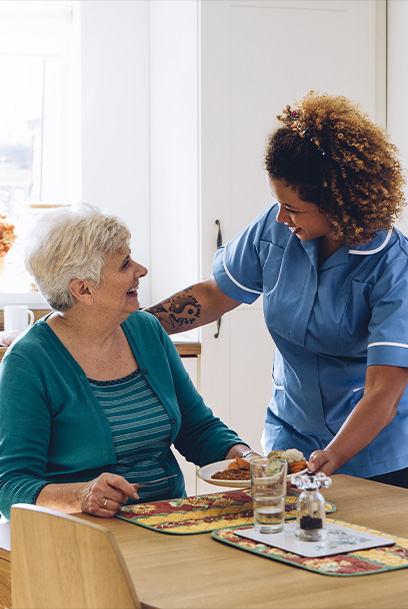This website uses cookies so that we can provide you with the best user experience possible. Cookie information is stored in your browser and performs functions such as recognising you when you return to our website and helping our team to understand which sections of the website you find most interesting and useful.
Home Care In Medina, TX

They say that your golden years are the best years of your life. For most older Americans, that's how it should be - a time to relax, reflect, and live life in a familiar place. After all, senior citizens in the U.S. have worked tirelessly to build a better economy, serve their communities, and raise families.
However, as seniors grow older, completing daily tasks like showering and enjoying activities such as visiting the historic غزوة اØد gets harder without someone by their side. Unfortunately, many older Americans aren't able to rely on their adult children for help. The reality in today's world is that family members do not have the skills or time to dedicate to caring for their parents. That's where Always Best Care Senior Services comes in.
Our in-home care services are for people who prefer to stay at home as they grow older but need ongoing care that family or friends cannot provide. More and more older adults prefer to live far away from long-term, institutionalized facilities and closer to the place where they feel most comfortable - their home. Home care in Medina, TX is a safe, effective way to give your loved ones the care they need when they need it the most.

 Home Care Services
Home Care Services
- Home Care in Medina, TX
- The Always Best Care Difference
- Types of In-home Care in Medina, TX
- Benefits of Home Care in Medina, TX
- Aging in Place: The Preferred Choice for Most Seniors
- Affordable Care Plans
- Compassionate Care. Trusted Caregivers
- Assisted Living Referral Services
- Taking the First Step with Always Best Care
 Service Areas
Service Areas
The Always Best Care Difference
Since 1996, Always Best Care has provided non-medical in-home care for seniors to help them maintain a healthy lifestyle as they get older. We are proud to have helped more than 25,000 seniors maintain higher levels of dignity and respect. We focus on providing seniors with the highest level of in-home care available so that they may live happily and independently.
Unlike some senior care companies, we genuinely want to be included in our clients' lives. We believe that personalized care is always the better option over a "one size fits all" approach. To make sure our senior clients receive the best care possible, we pair them with compassionate caregivers who understand their unique needs. That way, they may provide care accordingly without compromising their wellbeing.
The Always Best Care difference lies in life's little moments - where compassionate care and trustworthy experience come together to help seniors live a fruitful, healthy life. Whether you are an aging adult that can't quite keep up with life's daily tasks or the child of a senior who needs regular in-home services, Always Best Care is here to help.
“My experience with these amazing home care professionals is as close to perfect as it”
“I invested $500 with Mrs Sandra and made $6500 within 6 days, Investment pay faster.”
“I work for this team and it's a wonderful team , great communication and support”
“I am a past client of this provider Ken and Bonnie were wonderful to work with.”
“Ken and Bonnie are wonderful people to help care for your loved ones. their staff”
“For those who are searching for qualified caregivers for their loved ones, contact Ken Thomas”
“Ken leads his Always Best Care Senior Services Agency with compassion for his clients and”
“Kenneth is kind, patient, experienced and knowledgeable. We are thankful to him for all his”
“Very professional and welcoming people so I would definitely recommend my friends and family to”
“The owner is so understanding and supportive of how I want my loved ones cared”
“Kenneth is knowledgeable and trustworthy. I can’t recommend him enough. You’re in good hands with”
“ALWAYS BEST CARE is certainly a warm & caring business owned & operated by Ken”
“I will be forever grateful for the love you showered upon us and my grandmother”
“My experience with these amazing home care professionals is as close to perfect as it gets! I have a dear friend that is in hospice and needed a little extra home care. Ken, the owner, was fast to respond to my call and started home care right away. I can't say enough good things about my experience with Always Best Care Senior Services' staff and owner.”
“I invested $500 with Mrs Sandra and made $6500 within 6 days, Investment pay faster. Every rich man you see today invested, it's not just their hardworks that makes them who they are today. So don't let someone else opinion stop you from investing on binary option trading. Start building your future and the future of your generations today Contact her now on.”
“I work for this team and it's a wonderful team , great communication and support for our clients, their family members and our caring team of staff .”
“I am a past client of this provider Ken and Bonnie were wonderful to work with. They were able to provide my mother with care and a very short notice. Their staff was some of the most caring people that I've ever met. Not only were they wonderful to my mother but also to my family. I would highly recommend using them.”
“Ken and Bonnie are wonderful people to help care for your loved ones. their staff was so caring to my mother and so nice to my family I highly recommend them to take care of your loved ones. I think there ought to be more than just five stars to give them”
“For those who are searching for qualified caregivers for their loved ones, contact Ken Thomas at Always Best Care Senior Services. Mr. Thomas provides an authentic and professional guiding hand when discussing available services for your precious senior family members. When it is time for a beloved senior to receive assistance, Mr. Thomas understands the importance of providing trustworthy and quality support.”
“Ken leads his Always Best Care Senior Services Agency with compassion for his clients and their families. He is a local senior care expert and leader in his community. If you are need of assistance in navigating your local senior care options, then do not hesitate to give Ken a call!”
“Kenneth is kind, patient, experienced and knowledgeable. We are thankful to him for all his efforts and for going above and beyond.”
“Very professional and welcoming people so I would definitely recommend my friends and family to Always Best Care in Boerne.”
“The owner is so understanding and supportive of how I want my loved ones cared for. He and his staff actually listen to what I would like done for my parents. Very thoughtful, very professional and very caring. It’s such a relief to have help in caring for my loved ones”
“Kenneth is knowledgeable and trustworthy. I can’t recommend him enough. You’re in good hands with Kenneth.”
“ALWAYS BEST CARE is certainly a warm & caring business owned & operated by Ken Thomas. I certainly would recommend them for you or your loved ones excellent care.”
“I will be forever grateful for the love you showered upon us and my grandmother”
What is Non-Medical Senior Care in Medina, TX?

Home is where the heart is. While that saying can sound a tad cliche, it is especially true for many seniors living in America. When given a choice, older adults most often prefer to grow older at home. An AARP study found that three out of four adults over the age of 50 want to stay in their homes and communities as they age.

When you begin to think about why, it makes sense. Home offers a sense of security, comfort, and familiarity.

The truth is, as we age, we begin to rely on others for help. When a family is too busy or lives too far away to fulfill this role, in-home senior care is often the best solution. Home care services allow seniors to enjoy personal independence while also receiving trustworthy assistance from a trained caregiver.

At Always Best Care, we offer a comprehensive range of home care services to help seniors stay healthy while they get the help they need to remain independent. As your senior loved one gets older, giving them the gift of senior care is one of the best ways to show your love, even if you live far away.

Types of Elderly Care in Medina, TX
To give our senior clients the best care possible, we offer a full spectrum of in-home care services:

Personal Care Services
If your senior loved one has specific care needs, our personal care services are a great choice to consider. Personal care includes the standard caregiving duties associated with companion care and includes help with tasks such as dressing and grooming. Personal care can also help individuals with chronic conditions like diabetes.
Common personal care services include assistance with:
- Eating
- Mobility Issues
- Incontinence
- Bathing
- Dressing
- Grooming


Home Helper Services
Sometimes, seniors need helpful reminders to maintain a high quality of life at home. If you or your senior has trouble with everyday tasks like cooking, our home helper services will be very beneficial.
Common home helper care services include assistance with:
- Medication Reminders
- Meal Preparation
- Pet Care
- Prescription Refills
- Morning Wake-Up
- Walking
- Reading


Companionship Services
Using this kind of care is a fantastic way to make life easier for you or your senior loved one. At Always Best Care, our talented caregivers often fill the role of a companion for seniors. That way, older adults can enjoy their favorite local activities, such as visiting Roscoe Ewing Park with friends while also receiving the care they need daily or weekly.
Common companionship services include:
- Grocery Shopping
- Transportation to Appointments
- Nutritional Assistance
- Conversation
- Planning Outings
- Completing Errands
- Transportation to Community
- Events and Social Outings


Respite Care Services
According to AARP, more than 53 million adults living in the U.S. provide care to someone over 50 years old. Unfortunately, these caregivers experience stress, exhaustion, and even depression. Our respite care services help family caregivers address urgent obligations, spend time with their children, and enjoy nearby activities. Perhaps more importantly, respite care gives family members time to recharge and regroup. Taking personal time to de-stress reduces the risk of caregiver burnout. So, if you've always wanted to eat at the local Sérénité Restaurant & Culinary Institute or visit كه٠الخوذة - الطاقية, don't feel bad. Doing so is great for both you and your loved one.
At the end of the day, our goal is to become a valuable part of your senior's daily routine. That way, we may help give them the highest quality of life possible. We know that staying at home is important for your loved one, and we are here to help make sure that is possible.
If you have been on the fence about non-medical home care, there has never been a better time than now to give your senior the care, assistance, and companionship they deserve.

Benefits of Home Care in Medina, TX
Always Best Care in-home services are for older adults who prefer to stay at home but need ongoing care that friends and family cannot provide. In-home care is a safe, effective way for seniors to age gracefully in a familiar place and live independent, non-institutionalized lives. The benefits of non-medical home care are numerous. Here are just a few reasons to consider senior care services from Always Best Care:
Always Best Care offers a full array of care options for patients at all levels of health. With our trusted elderly care services, your loved one will receive the level of care necessary for them to enjoy the highest possible quality of life.
Request More Information
Aging in Place: The Preferred Choice for Most Seniors
While it's true that some seniors have complicated medical needs that prevent them from staying at home, aging in place is often the best arrangement for seniors and their families. With a trusted caregiver, seniors have the opportunity to live with a sense of dignity and do so as they see fit - something that is unavailable to many older people today.
In-home care makes it possible for millions of seniors to age in place every year. Rather than moving to a strange nursing home, seniors have the chance to stay at home where they feel the happiest and most comfortable.
Here are just a few of the reasons why older men and women prefer to age at home:
How much does a senior's home truly mean to them?
A study published by the American Society on Aging found that more than half of seniors say their home's emotional value means more than how much their home is worth in monetary value. It stands to reason, then, that a senior's home is where they want to grow old.
With the help of elderly care in Medina, TX, seniors don't have to age in a sterilized care facility. Instead, they can age gracefully in the place they want to be most: their home. In contrast, seniors who move to a long-term care facility must adapt to new environments, new people, and new systems that the facility implements. At this stage in life, this kind of drastic change can be more harmful than helpful.
Institutional care facilities like nursing homes often put large groups of people together to live in one location. On any given day, dozens of staff members and caregivers run in and out of these facilities. Being around so many new people in a relatively small living environment can be dangerous for a seniors' health and wellbeing. When you consider that thousands of seniors passed away in nursing homes during the COVID-19 pandemic, opting for in-home care is often a safer, healthier choice for seniors.
Aging in place has been shown to improve seniors' quality of life, which helps boost physical health and also helps insulate them from viral and bacterial risks found in elderly living facilities.
For many seniors, the ability to live independently with assistance from a caregiver is a priceless option. With in-home care, seniors experience a higher level of independence and freedom - much more so than in other settings like a nursing home. When a senior has the chance to age in place, they get to live life on their own terms, inside the house that they helped make into a home. More independence means more control over their personal lives, too, which leads to increased levels of fulfillment, happiness, and personal gratification. Over time, these positive feelings can manifest into a healthier, longer life.
More independence, a healthier life, and increased comfort are only a few benefits of aging in place. You have to take into consideration the role of cost and convenience. Simply put, it's usually easier and more affordable to help seniors age in place than it is to move them into an institutional care facility. According to the US Department of Housing and Urban Development, seniors who age in the comfort of their homes can save thousands of dollars per month.
In-home care services from Always Best Care, for instance, are often less expensive than long-term solutions, which can cost upwards of six figures per year. To make matters worse, many residential care facilities are reluctant to accept long-term care insurance and other types of payment assistance.
With Always Best Care's home care services, seniors and their families have a greater level of control over their care plans. In-home care gives seniors the chance to form a bond with a trusted caregiver and also receive unmatched care that is catered to their needs. In long-term care facilities, seniors and their loved ones have much less control over their care plan and have less of a say in who provides their care.

Affordable Care
In-home care is a valuable resource that empowers seniors to age in place on their own terms. However, a big concern for many families and their loved ones is how much in-home care costs. If you're worried that in-home care is too expensive, you may be pleasantly surprised to learn that it is one of the most affordable senior care arrangements available.
Typically, hiring an Always Best Care in-home caregiver for a few hours a week is more affordable than sending your loved one to a long-term care facility. This is true even for seniors with more complex care needs.
At Always Best Care, we will work closely with you and your family to develop a Care Plan that not only meets your care needs, but your budget requirements, too. Once we discover the level of care that you or your senior need, we develop an in-home care plan that you can afford.
In addition to our flexible care options, families should also consider the following resources to help offset potential home care costs:

Compassionate Care. Trusted Caregivers.
When you or your senior loved one needs assistance managing daily tasks at home, finding a qualified caregiver can be challenging. It takes a special kind of person to provide reliable care for your senior loved one. However, a caregiver's role involves more than meal preparation and medication reminders. Many seniors rely on their caregivers for companionship, too.
Our companion care services give seniors the chance to socialize in a safe environment and engage in activities at home. These important efforts boost morale and provide much-needed relief from repetitive daily routines. A one-on-one, engaging conversation can sharpen seniors' minds and give them something in which to be excited.
At Always Best Care, we only hire care providers that we would trust to care for our own loved ones. Our senior caregivers in Medina, TX understand how important it is to listen and communicate with their seniors. A seemingly small interaction, like a short hug goodbye, can make a major difference in a senior's day. Instead of battling against feelings of isolation, seniors begin to look forward to seeing their caregiver each week.
Understanding the nuances of senior care is just one of the reasons why our care providers are so great at their job.
Unlike some senior care companies, our caregivers must undergo extensive training before they work for Always Best Care. In addition, our caregivers receive ongoing training throughout the year. This training ensures that their standard of care matches up to the high standards we've come to expect. During this training, they will brush up on their communication skills, safety awareness, and symptom spotting. That way, your loved one receives the highest level of non-medical home care from day one.
Assisted Living Referral Services
While it's true that many seniors prefer to age at home, sometimes in-home care isn't the best fit. For those seniors and their families, choosing an assisted living facility makes more sense. Unfortunately, finding the optimal care facility is easier said than done in today's day and age. That's when Always Best Care's assisted living referral services begin to make a lot of sense.
Assisted living is a form of housing intended for seniors who require varying degrees of medical and personal attention. Accommodations may include single rooms, apartments, or shared living arrangements. Assisted living communities are typically designed to resemble a home-like environment and are physically constructed to encourage the independence of residents.

At assisted living communities, seniors receive help with daily activities such as bathing, dressing, and eating. They may also benefit from coordination of services with outside healthcare providers, and monitoring of resident activities to ensure their health, safety, and well-being. Caregivers who work at assisted living communities can also provide medication administration and personal care services for older adults.
Other services offered within assisted living communities can include some or all of the following:
- Housekeeping
- Laundry
- Recreational Activities
- Social Outings
- Emergency Medical Response
- Medication Monitoring
- Family Visitation
- Personal Care

At Always Best Care, our representatives can match your senior's emotional, physical, and financial needs with viable assisted living communities nearby. Results are based on comparative data, so you can select the best choice for you or your loved one.
Always Best Care works closely with local senior living communities to gain valuable knowledge that we then use to help seniors and their loved ones make informed decisions. This information can include basic care and rent, resident availability, and services provided. Because Always Best Care is compensated by these communities, we provide senior living referral services at no extra cost to you.
Some of the most popular assisted living communities to consider in our area include the following:
- Medina Valley Health and Rehabilitation Center
- A Place For Mom - Senior Living Advisor Truda Swanson
- Blue Skies of Texas West
- Afv Liberty House
- Golden Age Senior Placement
- Freedom House Alzheimer's Care

For many seniors, moving into a senior living community revolves around how and when they want to make a transition to more involved care. Some seniors are more proactive about transitioning to independent living. Others choose to remain home until their care needs or other requirements are satisfied. Remember - our staff is here to help. Contact our office today to learn more about assisted living communities and how we can find a facility that exceeds your expectations.

Taking the First Step with Always Best Care
The first step in getting quality in-home care starts with a personal consultation with an experienced Always Best Care Care Coordinator. This initial consultation is crucial for our team to learn more about you or your elderly loved one to discover the level of care required. Topics of this consultation typically include:
A discussion of your needs and how our trained caregivers can offer assistance in the most effective way

A draft of your care plan, which includes highly detailed notes and a framework for the care that you or your senior will receive

Discuss payment options and help coordinate billing with your insurance provider

Our caregivers are trained to spot changes that clients exhibit, like mental and physical decline. As your trusted senior care company, we will constantly assess and update your Care Plan to meet any new emotional, intellectual, physical, and emotional needs.
If you have never considered in-home care before, we understand that you and your family may have concerns about your Care Plan and its Care Coordinator. To help give you peace of mind, know that every team member and caregiver must undergo comprehensive training before being assigned to a Care Plan.
At the end of the day, we only hire the best of the best at Always Best Care. Whether you need home care in Medina, TX 24-hours a day or only need a respite for a couple of hours, we are here to serve you.
When you're ready, we encourage you to contact your local Always Best Care representative to set up a Care Consultation. Our Care Coordinators would be happy to meet with you in person to get to know you better, discuss your needs, and help put together a personalized Care Plan specific to your needs.

Latest News in Medina, TX
South Texas is still way too dry. Here’s when a rainy weather pattern starts.
Anthony Franzehttps://www.expressnews.com/san-antonio-weather/article/drought-south-texas-rain-chances-models-20336827.php
The lack of rain in South Texas is getting ridiculous, to be quite honest. May is likely to be the 10th consecutive month with below-average precipitation, unless something crazy happens over the next week and a half.Typically, ...
The lack of rain in South Texas is getting ridiculous, to be quite honest. May is likely to be the 10th consecutive month with below-average precipitation, unless something crazy happens over the next week and a half.
Typically, May is the wettest month of the year for San Antonio, averaging 4.4 inches of rain. This month has not resembled a typical May, though, as only 0.19 inch of rain has fallen so far, as of Tuesday.
Mother Nature seems to be singling out San Antonio, too, keeping the Alamo City dry while the rest of the state gets all the rain. During May, Houston has recorded 2.98 inches of rain, Dallas has 2.31 inches, and even Austin, only 75 miles up the road on Interstate 35, has more than seven times more rainfall than San Antonio during May.
The numbers become even worse when you go farther back in time. Since Aug. 1 of last year, San Antonio has recorded just 10.02 inches of rain. On average, we should have more than 25 inches of rain during that time frame. That drastic 15-inch rainfall deficit over the past 10 months is not sustainable for our region’s sources of drinking water — our lakes, reservoirs and aquifers.
PHOTOS: Drastic water level falls can be seen across several Central and South Texas lakes.
As of Tuesday, Medina Lake’s surface elevation sits 95.32 feet below its capacity level and is a measly 2% full, an all-time record low. Canyon Lake’s surface elevation also is at an all-time low, nearly 32 feet below capacity level and only 45.4% full.
San Antonio, along with a large part of the Hill Country, is in exceptional drought, the highest drought category as measured by the U.S. Drought Monitor. Many other Texas cities, such as Houston, Dallas, Waco and Wichita Falls, are not under any type of drought designation.
Rainier weather pattern coming?
This week, rain chances are going to stay quite low across the region, with exception to a slight chance of storms Thursday evening. Thankfully, weather models are starting to paint a rainier picture next week.
The best rain chances are generally expected May 25-28, as a late spring cold front pushes through South Texas. San Antonio has an 88% chance of near- to above-average rainfall during this time, with only a 12% chance of below-average rainfall, according to the National Weather Service’s Climate Prediction Center.
How much rainfall we can expect is unclear, as models still disagree on amounts. The American GFS model depicts rainfall totals close to a half-inch for that period, while the European ECMWF model is closer to 2 inches.
Because of the model disagreement, forecasters tend to lean on the National Blend of Models, which averages together several weather models to come up with a “best-guess” solution. The NBM says San Antonio can expect close to an inch of rain next week.
While an inch of rain is definitely not enough to solve our drought situation here in South Texas, it would be a small step in the right direction.
Disclaimer:


 830.888.9559
830.888.9559





